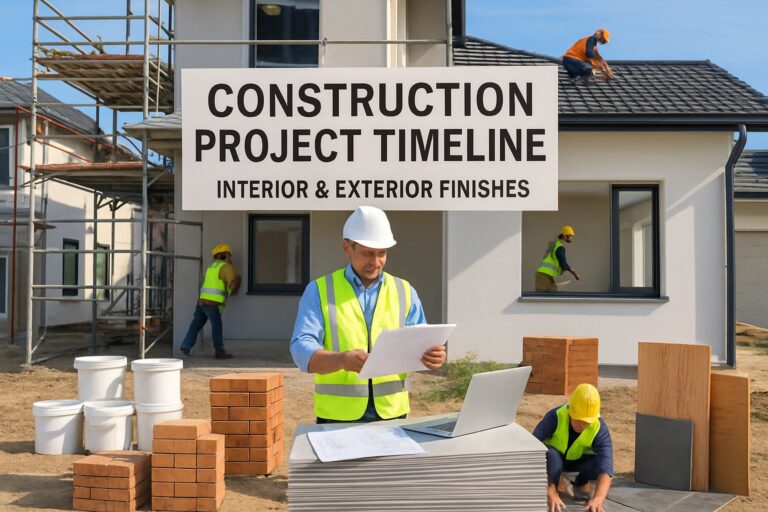Toronto General Contractor: Essential Tips for Your Renovation Project in 2025
Finding a reliable general contractor in Toronto can be challenging, but it’s essential for successful construction and renovation projects. A professional Toronto general contractor manages all aspects of your project, from obtaining permits to coordinating subcontractors, ensuring quality work that meets local building codes. They serve as your single point of contact throughout the construction process, saving you time and reducing stress.

Toronto’s unique building regulations and climate considerations require contractors who understand local construction requirements. The right professional will have experience with Toronto’s architectural styles and neighborhood-specific challenges, whether you’re renovating a Victorian home in Cabbagetown or building a modern addition in North York.
Key Takeaways
- Toronto general contractors coordinate all aspects of construction projects, from permits to final inspections, ensuring code compliance.
- Professional contractors familiar with Toronto’s unique building requirements can prevent costly mistakes and delays.
- Hiring an experienced local contractor saves time and reduces stress by providing a single point of contact for your entire project.
Understanding General Contracting in Toronto

General contracting in Toronto involves managing construction projects from start to finish while navigating the city’s unique building requirements and challenges. Professional contractors coordinate all aspects of construction while ensuring compliance with Ontario’s building codes.
Role of a General Contractor
General contractors in Toronto serve as project managers who oversee construction from planning to completion. They hire and coordinate subcontractors, obtain necessary permits, and ensure work meets quality standards and building codes.
These professionals manage budgets, timelines, and all construction logistics. They serve as the main point of contact for clients throughout the project, providing regular updates and addressing concerns as they arise.
Toronto’s general contractors must understand local zoning regulations and building requirements that are specific to the city’s neighborhoods. They handle unforeseen issues like weather delays or material shortages that might affect construction schedules.
Importance of Professionalism
Licensed general contractors in Toronto demonstrate professionalism through proper credentials, insurance, and adherence to Ontario’s construction standards. Professional contractors maintain clear communication with clients and provide detailed written contracts.
Quality work comes from contractors who stay updated on building techniques and materials. This includes continuing education and industry certifications that enhance their expertise.
Professional contractors in Toronto maintain strong relationships with reliable subcontractors and suppliers. This network ensures high-quality work and timely completion of projects.
Key professional qualities include:
- Transparent pricing without hidden fees
- Prompt response to client inquiries
- Detailed documentation of all project changes
- Proper site management and safety protocols
Toronto’s Construction Ecosystem
Toronto’s construction industry operates within a complex network of regulations, suppliers, and skilled trades. The city’s building department enforces strict codes that contractors must navigate effectively.
The seasonal nature of Toronto’s climate presents unique challenges. Professional contractors plan projects with weather considerations in mind, especially for exterior work during winter months.
Material sourcing in Toronto requires knowledge of local suppliers and alternative options when facing supply chain issues. Contractors must balance quality, cost, and availability.
Toronto’s diverse neighborhoods each present unique construction requirements. From historic preservation in older areas to modern specifications in newer developments, contractors must adapt their approaches accordingly.
The Scope of Services Offered
Toronto general contractors provide a wide range of construction and renovation services for both residential and commercial clients. They handle everything from small repairs to complete building projects.
From Renovation to New Construction
Home renovations transform existing spaces to meet new needs. These projects include kitchen and bathroom remodeling, basement finishing, and room additions. Contractors manage all aspects from demolition to final touches.
New construction projects involve building structures from the ground up. Contractors coordinate site preparation, foundation work, framing, and installation of all systems. They ensure every element meets building codes and quality standards.
Commercial renovations adapt business spaces for different uses or updated aesthetics. These often include office reconfigurations, retail space updates, and restaurant renovations. Contractors work carefully to minimize disruption to ongoing business operations.
Specialized Services
Most general contractors offer specialized trade services through their own teams or trusted subcontractors. Plumbing services include pipe installation, fixture replacement, and water heater installation.
Electrical work covers wiring, panel upgrades, lighting installation, and smart home technology integration. Safety and code compliance are top priorities in these systems.
Carpentry services range from custom cabinetry to structural framing. Skilled carpenters create custom features that define the character of a space.
Flooring installation encompasses hardwood, tile, laminate, vinyl, and carpet. Painting services include interior and exterior applications with proper preparation for lasting results.
Managing a Construction Project
Project management forms the core of a general contractor’s role. They create detailed timelines and ensure work progresses according to schedule. Regular client communication keeps everyone informed about progress and any necessary adjustments.
Contractors obtain all required permits and schedule inspections. They coordinate with municipal authorities to ensure legal compliance throughout the project.
Material procurement and subcontractor scheduling require careful coordination. Contractors source quality materials at reasonable prices and ensure they arrive when needed.
Quality control involves regular inspections and addressing issues promptly. The general contractor takes responsibility for delivering the final project to the client’s specifications and satisfaction.
Hiring General Contractors in Toronto
Finding the right contractor in Toronto requires careful consideration of their experience, credentials, and pricing structure. Taking time to properly vet potential candidates will save you money and frustration in the long run.
Assessing Experience and Workmanship
Experience matters when selecting Toronto General Contractors. Look for companies with at least 5-7 years in business, as they’ve likely encountered and solved various construction challenges.
Review their portfolio of completed projects. Photos of past work reveal their attention to detail and craftsmanship quality. Ask specifically about projects similar to yours.
Request site visits to current projects if possible. This provides firsthand observation of their work methods, site cleanliness, and safety protocols.
Consider specialization areas. Some Toronto contractors excel in home renovations while others focus on commercial projects or specific types of construction.
The best contractors will explain their process clearly and answer technical questions with confidence and clarity.
Verifying Credentials and Testimonials
Licensed General Contractors in Toronto must maintain proper credentials. Always verify:
- Valid business license
- Liability insurance (minimum $2 million coverage)
- WSIB (Workplace Safety and Insurance Board) certification
- Applicable trade certifications
Request at least 3-5 references from previous clients. Contact these references and ask specific questions about timeline adherence, budget management, and problem resolution.
Online reviews can provide additional insights. Check Google Business, HomeStars, and the Better Business Bureau for consistent feedback patterns.
Legitimate testimonials should include specific details about projects rather than just general praise. Be wary of contractors who cannot provide verifiable references.
Understanding Budget and Quotations
Detailed written quotations are essential when hiring Toronto contractors. These should include:
| Quote Component | What to Look For |
|---|---|
| Materials | Specific brands and quality grades |
| Labor costs | Breakdown by trade and hourly rates |
| Timeline | Clear project milestones |
| Payment schedule | Tied to completion stages |
Avoid contractors who require large upfront payments. Standard practice in Toronto is 10-15% deposit with subsequent payments tied to completion milestones.
Ask about potential additional costs. Experienced contractors will explain where budget overruns might occur and build appropriate contingencies.
Understand the difference between estimates and fixed-price contracts. Fixed-price offers more budget certainty but may include higher contingency costs.
Compare at least three quotations from different companies to understand market rates for your specific project.
Navigating Renovation Projects
Successful renovation projects require careful planning, proper documentation, and quality control to avoid costly mistakes and delays.
Developing Detailed Plans
Thorough planning forms the foundation of any successful renovation. Detailed blueprints should include all structural changes, electrical wiring, plumbing modifications, and material selections. These plans help contractors provide accurate cost estimates and timelines.
Plans should account for both aesthetic and functional needs. Homeowners should consider future requirements rather than just current ones. A well-designed renovation can increase property value while enhancing livability.
Professional designers can offer valuable insight into spatial optimization and material selection. They often identify potential problems before construction begins, saving time and money.
Budget planning is equally important. Smart renovators include a 15-20% contingency fund for unexpected issues that may arise during construction.
Acquiring Necessary Permits
Permits are legally required for most significant renovations in Toronto. The permit process verifies that all work meets building codes and safety standards.
Common permits include:
- Building permits for structural changes
- Electrical permits for wiring modifications
- Plumbing permits for water and waste systems
- Demolition permits when removing walls or structures
- Zoning permits for changes affecting property use
Applications typically require detailed plans prepared by qualified professionals. Processing times vary from 2-6 weeks depending on project complexity and permit type.
Working without proper permits can result in significant fines, construction halts, or even requirements to remove completed work.
Adhering to Quality Standards
Quality control is essential throughout the renovation process. Regular inspections help identify issues early when corrections are less expensive.
Materials should meet or exceed building code requirements. Quality materials may cost more initially but often reduce long-term maintenance expenses and extend the renovation’s lifespan.
Professional contractors follow established quality standards for:
- Framing and structural work
- Electrical and plumbing systems
- Insulation and energy efficiency
- Finishing details and aesthetics
Documentation of all work performed, materials used, and inspections passed creates a valuable record. This information proves useful for future maintenance or additional renovations.
Regular meetings between homeowners and contractors help maintain quality expectations and address concerns promptly.
Material and Construction Process

Selecting appropriate materials and implementing efficient construction techniques are critical elements in any successful building project. These factors directly impact project timelines, durability, and overall quality.
Choosing the Right Materials
Quality materials form the foundation of every successful construction project. Toronto contractors carefully evaluate options based on durability, energy efficiency, and climate suitability.
Concrete selections vary based on specific applications—higher PSI ratings for foundations and lower ratings for walkways. Premium roofing materials like architectural shingles offer superior protection against harsh Canadian winters.
Proper insulation materials significantly impact energy efficiency. Contractors typically recommend R-values between R-50 for attics and R-20 for walls in Toronto’s climate zone.
Waterproofing materials deserve special attention, particularly for basements. Modern waterproofing membranes offer superior protection compared to traditional tar-based applications, reducing water damage risks.
Innovative Building Techniques
Toronto contractors increasingly employ advanced construction methods to improve efficiency and quality. Prefabricated components allow for faster assembly while maintaining structural integrity.
Modern concrete pouring techniques utilize specialized additives that enhance strength while reducing curing times. This allows work to continue in various weather conditions.
Improved roofing installation methods now include ice-and-water shield barriers beneath shingles, providing additional protection against ice dams and water infiltration.
Advanced waterproofing approaches include exterior foundation membrane systems with proper drainage configurations. These systems direct water away from foundations more effectively than older techniques.
Ensuring Timely Project Completion
Effective project management requires detailed scheduling and coordination of materials delivery. Experienced contractors maintain relationships with reliable suppliers to prevent delays.
Weather considerations play a crucial role in Toronto construction timelines. Professional contractors build weather contingencies into schedules, particularly for concrete pouring and roofing installation.
Regular quality inspections throughout the construction process help identify and address issues before they cause delays. This proactive approach prevents costly rework.
Clear communication with clients about material lead times helps set realistic expectations. Some specialty materials may require ordering weeks in advance to ensure availability when needed.
Beyond Toronto: Services in the Greater Toronto Area
Professional general contracting services extend well beyond Toronto’s city limits. The Greater Toronto Area offers numerous opportunities for quality construction and renovation work across diverse communities.
Expanding to Neighboring Cities
Many Toronto-based general contractors now serve clients throughout the GTA. In Mississauga, contractors handle both residential renovations and commercial buildouts, particularly in growing business districts. Brampton projects often focus on home expansions and custom builds in developing neighborhoods.
Vaughan and Richmond Hill have seen increased demand for luxury home renovations and custom construction projects. These areas present unique building requirements that experienced contractors readily accommodate.
Oakville residents frequently seek contractors for heritage home renovations and waterfront property improvements. North York projects typically include multi-unit residential renovations and commercial retrofits.
Travel time and local building codes vary by municipality, but established contractors navigate these differences efficiently. Most reputable companies maintain relationships with inspectors and permit offices across the GTA.
Catering to Diverse Clientele
The Greater Toronto Area’s diverse population creates varied general contracting needs. Contractors now offer multilingual services to better communicate with clients from different backgrounds.
Cultural preferences influence design choices, with contractors adapting to specific requirements:
| Region | Common Project Types |
|---|---|
| Brampton | Multi-generational homes, basement apartments |
| Mississauga | Open-concept renovations, office conversions |
| Vaughan | Custom luxury homes, outdoor living spaces |
| Richmond Hill | Smart home technology integration, energy efficiency upgrades |
Contractors working throughout the GTA typically maintain flexible scheduling to accommodate different working patterns and family situations. Many now offer virtual consultations and digital project tracking.
Budget considerations vary widely across the region, with contractors developing tiered service options. This approach allows them to serve clients with different financial resources while maintaining quality standards.
Industries Served

Toronto general contractors provide specialized construction services across various sectors. They tailor their expertise to meet the unique requirements of different project types and industry standards.
Residential and Commercial Focus
Toronto general contractors excel in both residential and commercial construction projects. For residential clients, they handle new home construction, custom builds, and major renovations. These professionals understand the importance of creating functional living spaces that meet family needs while adhering to local building codes.
In the commercial sector, contractors manage office buildings, retail spaces, and restaurant construction. They coordinate complex projects involving multiple stakeholders and specialized requirements. Commercial new construction demands rigorous scheduling, budget management, and quality control.
Many contractors specialize in specific building types. Some focus on high-rise office towers, while others excel at restaurant buildouts with their unique kitchen and dining requirements.
Tailored Services for Different Sectors
Each industry requires specialized knowledge and approaches. In healthcare construction, contractors implement strict infection control measures and understand medical facility requirements. Educational institution projects involve careful planning around academic calendars and safety protocols for student environments.
For industrial projects, contractors address specialized needs like enhanced ventilation, reinforced flooring, and equipment installation. Retail construction focuses on creating attractive, functional spaces that enhance the shopping experience.
Restaurant construction projects require expertise in commercial kitchen installations, dining area design, and compliance with food service regulations. Contractors work closely with chefs and restaurateurs to create efficient workflows.
Public sector projects involve navigating government procurement processes and meeting stringent public safety standards. These construction projects often require additional documentation and accountability measures.
Conclusion

Choosing the right Toronto General Contractor is a crucial decision for any construction project. The best contractors combine professional expertise with a commitment to quality service.
Toronto’s construction industry offers many options, but those who prioritize clear communication stand out from the crowd. Reliable contractors maintain transparent pricing and realistic timelines throughout the project.
Client satisfaction remains the ultimate measure of a contractor’s success. Top general contractors in Toronto build their reputation through consistent delivery of high-quality results and positive client experiences.
Before signing any contract, verify credentials, insurance coverage, and previous work examples. This due diligence helps ensure your project will be completed to the highest standards.
Remember that the lowest bid isn’t always the best value. Quality materials and skilled craftsmanship may cost more initially but often save money in the long term through durability and fewer repairs.
The right Toronto General Contractor becomes a valuable partner in bringing your construction vision to life. Their expertise transforms plans into reality while managing all the complex details along the way.
Frequently Asked Questions

Toronto’s construction industry has specific standards, costs, and qualifications that homeowners and businesses should understand before starting a project. Finding the right contractor requires careful evaluation of credentials and experience.
How can I find a list of reputable general contractors in Toronto?
Homeowners can search for reputable general contractors through the Toronto Construction Association or Building Toronto directory. These organizations maintain verified listings of qualified professionals.
The Better Business Bureau also provides ratings and reviews of contractors based on customer experiences and complaint history.
Asking for recommendations from friends, family, or neighbors who have completed similar projects can provide valuable insights into a contractor’s reliability and quality of work.
What are the criteria for evaluating general contractors in Toronto?
Proper licensing through the Ontario College of Trades is essential for any legitimate general contractor. This verification ensures they meet provincial standards.
Insurance coverage, including liability insurance and WSIB (Workplace Safety and Insurance Board) coverage, protects both the homeowner and workers during the project.
Previous work samples, client testimonials, and detailed written estimates are important indicators of a contractor’s thoroughness and transparency.
Which companies are considered the best for commercial construction projects in Toronto?
Companies specializing in commercial construction typically have experience with larger structural projects, retail spaces, and office buildings. The best firms demonstrate expertise in commercial code compliance.
Established firms with portfolios showcasing multi-level or mixed-use developments generally have the necessary experience for complex commercial projects.
Companies with LEED certification experience are increasingly valued for sustainable commercial construction in Toronto’s growing eco-conscious market.
What qualifications should I look for when hiring a general contractor in Ontario?
A valid business license and registration with the Ontario College of Trades are mandatory qualifications. These credentials confirm legal operation status.
Specific certifications like Red Seal endorsements indicate advanced training in particular construction specialties.
Project management experience, clear communication skills, and knowledge of Toronto’s building codes and permit processes are essential qualifications beyond paper credentials.
What is the average cost of small-scale renovation projects in Toronto?
Kitchen renovations in Toronto typically range from $25,000 to $50,000 depending on finishes, appliances, and structural changes required.
Bathroom renovations average between $10,000 and $25,000, with factors like plumbing modifications and fixture quality affecting the final cost.
Basement finishing projects generally cost $35-$55 per square foot, meaning a standard 1,000 square foot basement might cost $35,000-$55,000 to complete.
How are general contractors typically compensated for their services in Toronto?
Most Toronto contractors use either fixed-price contracts or cost-plus arrangements. Fixed-price contracts provide certainty about the total project cost upfront.
Payment schedules usually follow project milestones, with 10-30% due at signing, followed by payments at predetermined completion stages.
Change orders for work outside the original scope are billed separately, making detailed initial contracts essential for budget management.







